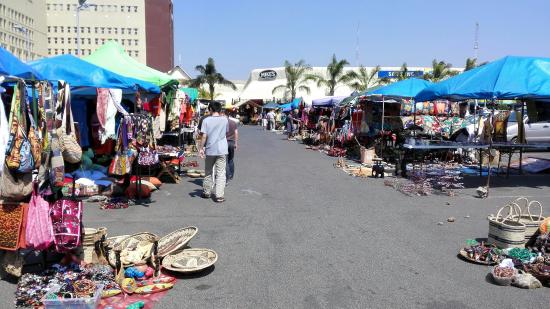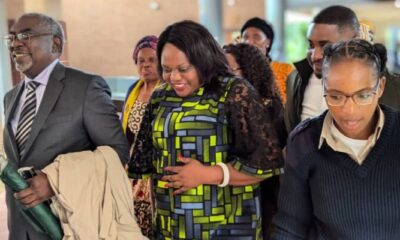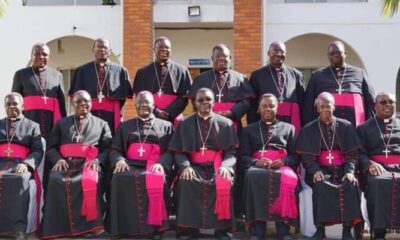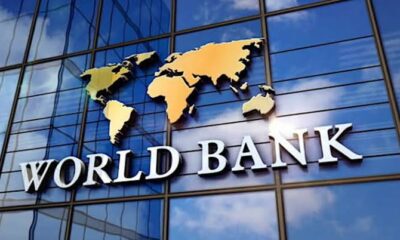Strictly Personal
How China’s demands at debt talks are adversely affecting Zambian Economy – A Critical Analysis, By Mwansa Chalwe Snr
Published
2 years agoon

The Monetary Policy Committee (MPC) of the Bank of Zambia in its Statement of 15 February 2023, has confirmed beyond reasonable doubt that China’s latest demands at the debt restructuring talks have started to adversely affect the Zambian economy. The Monetary Policy Statement demonstrated the adverse effects that the stalled debt restructuring talks were having on the economy, in terms of the exchange rate, interest rates, inflation, and job creation, due to the uncertainty. The 2022 economic stabilisation gains are all at risk of reversal, if no urgent diplomatic action is taken by Zambia.
Rapid depreciation of the Kwacha
The demand by China that Zambia’s local currency government bonds held by foreign investors, should be included in the deal, and has particularly contributed to the rapid depreciation of the kwacha, which has resulted in the increase of fuel prices and public transport fares. The kwacha exchange rate, is Zambia’s most important economic metric as it affects all Zambians regardless of their status because Zambia is an import dependent country
The Bank of Zambia’s statement shows that the demands by China have contributed to the reversal of the gains that the Kwacha made in 2022, which earned it the title of the best performing currency in the world. The Kwacha has been depreciating against the dollar almost every day for two months now, and it is at its weakest in nearly a year, as talks drag on with no end in sight.
“After a cumulative appreciation of 10.0 percent in the previous two quarters, the Kwacha depreciated by 4.3 percent against the US dollar to an average of K16.71 in the fourth quarter of 2022. The depreciating trend in the Kwacha has persisted in 2023, with the Kwacha trading at K19.33 per US dollar as at February 14.
“Foreign financial institutions, that had typically been suppliers of foreign exchange, are now more pronounced on the demand side as they are divesting from the domestic market. This is principally due to tighter global financial conditions, negative sentiments associated with the protracted debt restructuring negotiations and uncertainty around the treatment of non-resident holders of Government securities,” the Bank of Zambia Statement said.
Higher inflation outlook for 2023
The Central Bank has also revised its inflation outlook for 2023.It has partially attributed the forecasted higher inflation to China’s demand to have Zambian foreign investors in local bonds to be included in the restructuring deal.
“Over the forecast horizon, inflation is projected to increase and remain above the 6 – 8 percent target range. Inflation is now projected to average 11.1 percent in 2023 compared to the November 2022 forecast of 8.5 percent,” The Bank of Zambia Governor, Dr. Denny Kalyalya said. “Negative sentiments arising from the protracted debt restructuring negotiations (and more so the uncertainty over the treatment of the non-resident holders of Government securities) are also projected to add to elevated inflationary pressures.”
Forecast Economic activity and job Creation
The Bank of Zambia has increased the benchmark monetary policy rate to 9.25% from 9.0%. And it recently increased the statutory reserve ratio to 11.5 percent on commercial banks’ deposit liabilities, in order to support the depreciating kwacha. These measures will negatively affect the economy. The cost of borrowing (interest rates) will go up, and there will be continued shortage of liquidity in the economy, which will result in lower economic activity like last year and fewer jobs created.
Geo-political dimension to the debt talks and China’s demands
There is something that most Zambians do not seem to understand about the restructuring talks. There is a chess game that is being played between the US and China, with Zambia being the pawn in the game – which I predicted in my book two years ago. There is clearly a stealth “war” going on between the West/US and China in these debt restructuring talks. And if anyone thinks geo-politics and economics is not at play in the current talks, they must be either quite naïve or have not been following geopolitics of the past twenty years. They are well advised to go research and read more.
China cannot be blamed for its current demands because it is merely pursuing its self-interest by using its economic power in negotiations. China, is in some way, leading other emerging economies in trying to reform the global system for restructuring sovereign debt, which currently excludes multilateral banks like the World Bank. In general, China wants respect and recognition commensurate with its current status as the number one bilateral lender, the number two world economy, and Zambia’s largest bilateral creditor, and the key to the restructuring deal.
The Chinese seem to be pursuing a two pronged strategy in the debt restructuring negotiations, in as far as their demands are concerned. This can only be deciphered by experts on the subject. One is aimed at the West, to pursue reforms in sovereign restructuring, and the other is aimed at the Zambian government so that China can protect its turf which is under some apparent threat.
China has made repeated calls at the restructuring talks and in press conferences, for the World Bank and other multilateral development banks to participate in debt reductions. This demand is clearly targeted at the Parish Club and G7 countries in the debt negotiations.
On the other hand, China is demanding the almost impractical condition, of foreign investors in Zambia’s local currency bonds, to be part of the restructuring deal. This demand is clearly aimed at the Zambian government. It is the clearest sign yet to Zambia that it should directly engage with China at the highest level in order to allay the perception that Zambia has outsourced negotiations to Western countries and institutions. It is designed to put economic pressure on Zambia to act.
This week, Zambians will be on the edge watching the proceedings of the G20 finance minister’s central bank governors meetings in Bengaluru, India, from Feb. 23-25. They will be waiting for the outcome of the talks. The meeting’s agenda will include a debt round table discussion on Feb. 25, which China is part of. This has been organized by the host India, the IMF, and the World Bank. It will discuss broader issues that are creating roadblocks to debt relief deals for Zambia, Sri Lanka, and other countries.
During the G20 meetings in India, the US Secretary of Treasury, Janet Yellen, is expected to focus on unblocking debt restructuring talks and press China to speed up its debt relief for Zambia. The US government’s expectation is to see a deal struck on Zambian debt at these meetings. And the US embassy in Lusaka has echoed the same sentiments: “As Zambia’s largest bilateral creditor and as a co-chair of Zambia’s official creditor committee under the G20 Framework, China has an excellent opportunity to follow through on its announced commitment by moving expeditiously to restructure Zambia’s debt so all Zambians can begin benefiting from inclusive economic growth without delay.”
How to unlock the debt restructuring talks
On the basis of past experience, and knowing how the Chinese operate, it is unlikely that they will be swayed and greatly influenced by appeals from their geopolitical rival, the US or the Bretton Woods institutions-International Monetary Fund and World Bank in making their decisions on the deal.
Last year, the new Chinese Ambassador to Zambia Du Xiaohui disclosed that China never wanted to join the G20 Creditors Committee because it believes that friendly bilateral cooperation is the best way to deal with debt between friends. It had to take a direct phone call from Zambian President Hakainde Hichilema on 31 May, 2022 to Chinese President Xi Jinping to unlock the stalemate. And within two weeks, on the 16th June, 2022, the first Official Creditors Committee (OCC) meeting was held after over six months of failure, following the provisional approval of Zambia’s $1.3billion IMF deal on 3 December, 2021.
And following the aforementioned phone call, the Chinese Foreign Affairs Ministry released a statement about what President Xi Jinping had told President Hichilema. The contents of the statement gives a cue of what Zambia needs to do, to unlock the debt restructuring deal.
“The two sides should strengthen strategic communication and policy synergy, fully implement the nine programs of the Forum on China-Africa Cooperation (FOCAC), deepen mutually beneficial cooperation in various fields, promote more Zambian goods, especially quality agricultural products, to enter the Chinese market, and strengthen anti-pandemic cooperation. Both sides should carry forward the Tanzania-Zambia Railway (Tazara) spirit, keep it updated in accordance with the trend of the times, and make Tazara an important transportation channel in the region. The two sides should adhere to independent foreign policy, firmly safeguard international fairness and justice, and uphold the international system with the United Nations at its core and the international order underpinned by international law,” The Statement said.
Conclusion
President HH should find it easy to arrange a meeting to unlock the deal with China for a number of reasons. First, he did not publicly criticise China during the 2021 general elections campaign, unlike some other previous Zambian Presidential candidates. Two, he must have established some good rapport with President Xi Jinping through last year’s telephone conversation. And in general, there has been no express antagonism between Zambia and China since he became President. The deadlocked debt restructuring talks provides him with a great opportunity to recalibrate Zambia’s relationship with China. READ MORE:https://www.lusakatimes.com/2021/07/27/zambia-china-economic-ties-need-recalibration/
President Hakainde Hichilema, has repeatedly stated that his administration intends to continue with the tradition long-established by his predecessors of upholding the all-weather friendship between Zambia and China, and so it should not be too difficult to engage China at Presidential level.
China is Zambia’s big “brother”. The two’s relationship dates back to Zambia’s pre-independence. It is a sixty eight (68) year old relationship, dating back to 1955.The deal is so easy to unlock, if Zambia directly approaches China at the highest level. And this is the appropriate timing for which nobody would be faulted.
The writer is a Chartered Accountant, Author and an independent financial commentator and analyst.
You may like
-


Zambia: APP leader lampoons PF over pledge to reverse forfeited properties
-


Wanted Zambian MP who escaped from prison custody captured in Harare
-


Zambia: NDC president fined K25,000 for allegedly defaming presidential aide
-


Catholic bishops in Zambia decry ‘shrinking democratic space’, hounding of opposition parties
-


Again, Zambian court denies bail to ex-defence minister on medical grounds
-


World Bank pledges $3b to support Zambia’s development goals
Strictly Personal
Budgets, budgeting and budget financing, By Sheriffdeen A. Tella, Ph.D.
Published
2 days agoon
November 20, 2024
The budget season is here again. It is an institutional and desirable annual ritual. Revenue collection and spending at the federal, State and local government levels must be authorised and guided by law. That is what budget is all about. A document containing the estimates of projected revenues from identified sources and the proposed expenditure for different sectors in the appropriate level of government. The last two weeks have seen the delivery of budget drafts to various Houses of Assembly and the promise that the federal government would present its draft budget to the National Assembly.
Do people still look forward to the budget presentation and the contents therein? I am not sure. Citizens have realised that these days, governments often spend money without reference to the approved budget. A governor can just wake up and direct that a police station be built in a location. With no allocation in the budget, the station will be completed in three months. The President can direct from his bathroom that 72 trailers of maize be distributed to the 36 states as palliatives. No budget provision, and no discussion by relevant committee or group.
We still operate with the military mentality. We operated too long under the military and of the five Presidents we have in this democracy, two of them were retired military Heads of State. Between them, they spent 16 years of 25 years of democratic governance. Hopefully, we are done with them physically but not mentally. Most present governors grew up largely under military regimes with the command system. That is why some see themselves as emperor and act accordingly. Their direct staff and commissioners are “Yes” men and women. There is need for disorientation.
The importance of budget in the art of governance cannot be overemphasized. It is one of the major functions of the legislature because without the consideration and authorisation of spending of funds by this arm of government, the executive has no power to start spending money. There is what we refer to as a budget cycle or stages. The budget drafting stage within the purview of the executive arm is the first stage and, followed by the authorisation stage where the legislature discusses, evaluates and tinkers with the draft for approval before presenting it to the President for his signature.
Thereafter, the budget enters the execution phase or cycle where programmes and projects are executed by the executive arm with the legislature carrying out oversight functions. Finally, we enter the auditing phase when the federal and State Auditors verify and report on the execution of the budgets. The report would normally be submitted to the Legislature. Many Auditor Generals have fallen victim at this stage for daring to query the executives on some aspects of the execution in their reports.
A new budget should contain the objectives and achievements of the preceding budget in the introduction as the foundation for the budget. More appropriately, a current budget derives its strength from a medium-term framework which also derives its strength from a national Development Plan or a State Plan. An approved National Plan does not exist currently, although the Plan launched by the Muhammadu Buhari administration is in the cooler. President Tinubu, who is acclaimed to be the architect of the Lagos State long-term Plan seems curiously, disillusioned with a national Plan.
Some States like Oyo and Kaduna, have long-term Plans that serve as the source of their annual budgets. Economists and policymakers see development plans as instruments of salvation for developing countries. Mike Obadan, the former Director General of the moribund Nigeria Centre for Economic and Management Administration, opined that a Plan in a developing country serves as an instrument to eradicate poverty, achieve high rates of economic growth and promote economic and social development.
The Nigerian development plans were on course until the adoption of the World Bank/IMF-inspired Structural Adjustment Programme in 1986 when the country and others that adopted the programme were forced to abandon such plan for short-term stabilisation policies in the name of a rolling plan. We have been rolling in the mud since that time. One is not surprised that the Tinubu administration is not looking at the Buhari Development Plan since the government is World Bank/IMF compliant. It was in the news last week that our President is an American asset and by extension, Nigeria’s policies must be defined by America which controls the Bretton Woods institutions.
A national Plan allows the citizens to monitor quantitatively, the projects and programmes being executed or to be executed by the government through the budgeting procedure. It is part of the definitive measures of transparency and accountability which most Nigerian governments do not cherish. So, you cannot pin your government down to anything.
Budgets these days hardly contain budget performance in terms of revenue, expenditure and other achievements like several schools, hospitals, small-scale enterprises, etc, that the government got involved in successfully and partially. These are the foundation for a new budget like items brought forward in accounting documents. The new budget should state the new reforms or transformations that would be taking place. Reforms like shifting from dominance of recurrent expenditure to capital expenditure; moving from the provision of basic needs programmes to industrialisation, and from reliance on foreign loans to dependence on domestic fund mobilisation for executing the budget.
That brings us to the issue of budget deficit and borrowing. When an economy is in recession, expansionary fiscal policy is recommended. That is, the government will need to spend more than it receives to pump prime the economy. If this is taken, Nigeria has always had a deficit budget, implying that we are always in economic recession. The fact is that even when we had a surplus in our balance of payment that made it possible to pay off our debts, we still had a deficit budget. We are so used to borrowing at the national level that stopping it will look like the collapse of the Nigerian state. The States have also followed the trend. Ordinarily, since States are largely dependent on the federal government for funds, they should promote balanced budget.
The States are like a schoolboy who depends on his parents for school fees and feeding allowance but goes about borrowing from classmates. Definitely, it is the parents that will surely pay the debt. The debt forgiveness mentality plays a major role in the process. Having enjoyed debt forgiveness in the past, the federal government is always in the credit market and does not caution the State governments in participating in the market. Our Presidents don’t feel ashamed when they are begging for debt forgiveness in international forum where issues on global development are being discussed. Not less than twice I have watched the countenance of some Presidents, even from Africa, while they looked at our president with disdain when issues of debt forgiveness for African countries was raised.
In most cases, the government, both at the federal and state cannot show the product of loans, except those lent by institutions like the World Bank or African Development Bank for specific projects which are monitored by the lending institutions. In other cases, the loans are stolen and transferred abroad while we are paying the loans. In some other cases, the loans are diverted to projects other than what the proposal stated. There was a case of loans obtained based on establishing an international car park in the border of the State but diverted to finance the election of a politician in the State. The politician eventually lost the election but the citizens of the State have to be taxed to pay the loan. Somebody as “Nigeria we hail thee”.
Transformation in budgeting should commence subsequently at the State and federal level. Now that local government will enjoy some financial autonomy and therefore budgeting process, they should be legally barred from contracting foreign loans. They have no business participating in the market. They should promote balanced budget where proposed expenditures must equal the expected revenues from federal and internal sources. The State government that cannot mobilise, from records, up to 40 percent of its total budget from IGR should not be supported to contract foreign loans. The States should engage in a balanced budget. The federal government budget should shift away from huge allocations to recurrent expenditure towards capital expenditure for capital formation and within the context of a welfarist state.
Sheriffdeen A. Tella, Ph.D.
Strictly Personal
African Union must ensure Sudan civilians are protected, By Joyce Banda
Published
4 weeks agoon
October 25, 2024
The war in Sudan presents the world – and Africa – with a test. This far, we have scored miserably. The international community has failed the people of Sudan. Collectively, we have chosen to systematically ignore and sacrifice the Sudanese people’s suffering in preference of our interests.
For 18 months, the Rapid Support Forces (RSF) and the Sudanese Armed Forces (SAF) have fought a pitiless conflict that has killed thousands, displaced millions, and triggered the world’s largest hunger crisis.
Crimes against humanity and war crimes have been committed by both parties to the conflict. Sexual and gender-based violence are at epidemic levels. The RSF has perpetrated a wave of ethnically motivated violence in Darfur. Starvation has been used as a weapon of war: The SAF has carried out airstrikes that deliberately target civilians and civilian infrastructure.
The plight of children is of deep concern to me. They have been killed, maimed, and forced to serve as soldiers. More than 14 million have been displaced, the world’s largest displacement of children. Millions more haven’t gone to school since the fighting broke out. Girls are at the highest risk of child marriage and gender-based violence. We are looking at a child protection crisis of frightful proportions.
In many of my international engagements, the women of Sudan have raised their concerns about the world’s non-commitment to bring about peace in Sudan.
I write with a simple message. We cannot delay any longer. The suffering cannot be allowed to continue or to become a secondary concern to the frustrating search for a political solution between the belligerents. The international community must come together and adopt urgent measures to protect Sudanese civilians.
Last month, the UN’s Independent International Fact-Finding Mission for Sudan released a report that described a horrific range of crimes committed by the RSF and SAF. The report makes for chilling reading. The UN investigators concluded that the gravity of its findings required a concerted plan to safeguard the lives of Sudanese people in the line of fire.
“Given the failure of the warring parties to spare civilians, an independent and impartial force with a mandate to safeguard civilians must be deployed without delay,” said Mohamed Chande Othman, chair of the Fact-Finding Mission and former Chief Justice of Tanzania.
We must respond to this call with urgency.
A special responsibility resides with the African Union, in particular the AU Commission, which received a request on June 21 from the AU Peace and Security Council (PSC) “to investigate and make recommendations to the PSC on practical measures to be undertaken for the protection of civilians.”
So far, we have heard nothing.
The time is now for the AU to act boldly and swiftly, even in the absence of a ceasefire, to advance robust civilian protection measures.
A physical protective presence, even one with a limited mandate, must be proposed, in line with the recommendation of the UN Fact-Finding Mission. The AU should press the parties to the conflict, particularly the Sudanese government, to invite the protective mission to enter Sudan to do its work free from interference.
The AU can recommend that the protection mission adopt targeted strategies operations, demarcated safe zones, and humanitarian corridors – to protect civilians and ensure safe, unhindered, and adequate access to humanitarian aid.
The protection mission mandate can include data gathering, monitoring, and early warning systems. It can play a role in ending the telecom blackout that has been a troubling feature of the war. The mission can support community-led efforts for self-protection, working closely with Sudan’s inspiring mutual-aid network of Emergency Response Rooms. It can engage and support localised peace efforts, contributing to community-level ceasefire and peacebuilding work.
I do not pretend that establishing a protection mission in Sudan will be easy. But the scale of Sudan’s crisis, the intransigence of the warring parties, and the clear and consistent demands from Sudanese civilians and civil society demand that we take action.
Many will be dismissive. It is true that numerous bureaucratic, institutional, and political obstacles stand in our way. But we must not be deterred.
Will we stand by as Sudan suffers mass atrocities, disease, famine, rape, mass displacement, and societal disintegration? Will we watch as the crisis in Africa’s third largest country spills outside of its borders and sets back the entire region?
Africa and the world have been given a test. I pray that we pass it.
Dr Joyce Banda is a former president of the Republic of Malawi.
EDITOR’S PICK


IMF mission concludes 4th loan program assessment in Egypt
Following the completion of a recent visit to Egypt, the International Monetary Fund (IMF) has announced that its mission had...


Mali’s junta names spokesman Abdoulaye Maiga new Prime Minister
A day after dismissing Choguel Maiga for criticising the government, Mali’s governing junta named its spokesperson, Abdoulaye Maiga, as Prime...


Brazilian meatpacker JBS invests $2.5 billion in Nigeria, builds six facilities
Brazilian meatpacker JBS says it has inked a memorandum of understanding with the Nigerian government for a $2.5 billion investment...


China’s Xi meets with Morocco’s Crown Prince
Morocco’s official media reports that Chinese President, Xi Jinping, visited Morocco briefly on Thursday. According to Morocco’s MAP, Crown Prince...


65% of Nigerian households lack money for healthy food—Survey
A survey conducted by the National Bureau of Statistics (NBS) has revealed that around 65% of Nigerian households, which is...


Ghana partners with The Gambia to provide free roaming services
Ghana and The Gambia are in the process of launching free roaming services that will enhance a West African connectivity....


Zambia: APP leader lampoons PF over pledge to reverse forfeited properties
Leader of one of Zambia’s opposition parties, Advocates for People’s Prosperity (APP), Mwenye Musenge, has criticised the Patriotic Front (PF)...


Ghanaian winger Fatawu out for season with ACL injury
Ghana and Leicester City winger, Abdul Fatawu, has been ruled out of the rest of the EPL season after suffering...


DRC authorities arrest six over break-in at Lumumba’s Mausoleum
Police in the Democratic Republic of Congo (DRC) say six people have been arrested over a break-in and vandalism at...


Finnish court imprisons Nigeria’s Simon Ekpa for aiding terrorism
Simon Ekpa, a Nigerian separatist leader based abroad, has been placed under detention by the Päijät Häme District Court...
Trending
-

 Sports2 days ago
Sports2 days agoSA football legend Lucas ‘Masterpieces’ Moripe passes away
-

 Metro2 days ago
Metro2 days agoWanted Zambian MP who escaped from prison custody captured in Harare
-

 Metro1 day ago
Metro1 day agoNigerian Senate confirms influx of terrorists from Mali, Burkina Faso into the country
-

 Culture2 days ago
Culture2 days agoMiss SA opens up on why she withdrew from Miss Universe pageant


